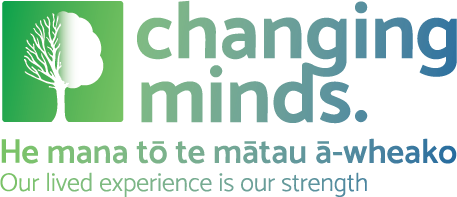Pae Ora (Healthy Futures) (Improving Mental Health Outcomes) Amendments Bill.
This Bill was shared for public consultation in March 2024. With the support of our community Changing Minds prepared a submission to emphasis the need for genuine Lived Experience inclusion and leadership. Following our submission on 28 March 2024, we’re pleased to shared that our Kaiwhaihua, Jodie, will be continuing this kōrero at the Select Committee hearing in May.
“What’s a Bill?” - A Bill is a draft piece of legislation that either creates or changes an Act. Most Bills go through several stages of public feedback and discussions in parliament (called ‘readings’) as well as discussions at Select Committee hearings. When this process is complete the Bill is “enacted” and becomes “law.”
What we heard from YOU!
Thank you to the more than 40 members of the Lived Experience community who contributed to this mahi.
You told us that you want changes as a result of this Bill to include:
Broader Lived Experience Leadership engagement.
A monitoring and evaluation plan that is accountable to Tāngata Mātau ā-wheako.
Your concerns regarding the future of the Te Hiringa Mahara | The Mental Health and Wellbeing Commission as an independent crown-entity.
Observations of the challenges present in the current health system and related social policies and infrastructures.
Equitable engagement and health outcomes following the disestablishment of Te Aka Whai Ora | The Māori Health Authority.
The need for clarification on how existing systems, frameworks and policies will complement and support a Mental Health and Wellbeing Strategy.
Concerns for how key population groups will be engaged and present in the strategy (including: peer support, whānau perspectives, migrant and refugee populations, and Asian communities).
The need for equitable prioritisation, funding and resources for mental health, addictions, and disabilities in Aotearoa alongside physical health outcomes.
This informed our key points that:
Lived Experience Leadership and voices must inform the Mental Health and Wellbeing Strategy from individuals and organisations outside of the Government, system, and traditional health frameworks (e.g., community and consumer voices).
The Act must state how Te Ao Māori representation and consultation will be prioritised following the disestablishment of the Māori Health Authority.
Lived Experience Leadership engagement on the Mental Health and Wellbeing Strategy and the Government Policy Statement on Health must be undertaken genuinely and in line with the Code of Expectations for Health Entities.
The Mental Health and Wellbeing Strategy must engage a range of Lived Experience perspectives on what meaningful health and wellbeing outcomes look like for them.
Tāngata Mātau ā-wheako (people with Lived Experience) and/or Mental Health and Addiction consumers must have adequate opportunities to provide further feedback on the Mental Health and Wellbeing Strategy and the GPS. This includes timeframes for engagement, resources, and support for individuals to contribute and accessible feedback channels.
The roles and responsibilities of the Minister of Health, and the Minister of Mental Health need to be clarified under Section 10 (Overview of Minister’s role) of the Act.
What is the Bill trying to do?
1. It adds the Mental Health and Wellbeing Commission to the list of Health Entities, which also includes Health New Zealand, the Health Quality and Safety Commission (the HQSC), the Māori Health Authority, Pharmac and NZBOS.
Changing Minds notes that it has recently (27 February 2024) been announced that the Māori Health Authority has been disestablished. Our view is that any changes to the Pae Ora or other Acts must ensure the health outcomes of Māori are protected and upheld following this change.
2. It requires a Mental Health and Wellbeing Strategy (the Strategy) to be included under the Act, which will be prepared by the Minister of Health.
As part of the National, Act and New Zealand First Coalition Government we now have a Minister of Mental Health. The Bill does not make reference to this Minister, and because of this the decision making and ownership of the Mental Health and Wellbeing strategy still sits with the Minister of Health. Changing Minds would like to see the Minister of Mental Health’s roles and responsibilities for creating this strategy be clarified as part of the Act.
3. The Strategy’s purpose will be to provide a framework for Health Entities to make long-term improvements to mental health and addiction outcomes. It will assess the performance of the health sector and medium-long term trends that affect mental health and addiction outcomes. It will also prioritise actions for improving outcomes.
4. When the Government releases their Policy Statement on Health, or the ‘GPS’, which has to happen every three years, they will now have to consult with the Mental Health and Wellbeing Commission.
As we mentioned above, the Bill currently still references the Māori Health Authority and our concerns regarding Te Ao Māori prioritisation, representation and consultation apply equally to this change.

